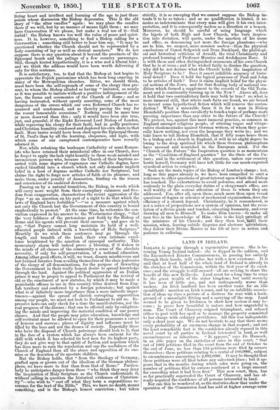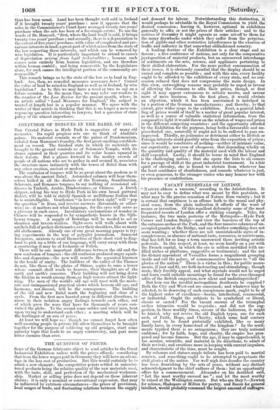a LAND IN IRELAND.
IRRLAND is passing through a regenerative process. She is becoming Young Ireland indeed : she is dipped in the caldron, and the Encumbered Estates Commissioners, in passing her entirely through their hands, will endue her with a new existence. It is said that at least half of the whole land of Ireland is already in the clutches of the Commission, within the first year of its existence; and the struggle is still onward—all are seeking to share the benefit of this new Bethesda. Land must for a long time to come be the great wealth of the sister kingdom; but until recently it has been of little use, and not unfrequently worse than useless. An Irish landlord has been another name for an idle spendthrift : mention an Irish tenant, and by an infallible association of ideas up rises a picture of a distress for rent with a background of a moonlight flitting and a carrying off the crop. Land seemed to be given to Irishmen to show how melees it may become ; to prove how bountiful is nature and how ungrateful is man. The Court of Chancery reigned triumphant, and refused either to part with her spoil or to manage the property committed to her charge with ordinary providence. All this was indisputable only a short year ago. We do not hesitate to say that there seems every probability of an enormous change in that respect; and not the least remarkable fact is the confidence already reposed in this novel court by all parties in Ireland interested in land, as well encumbrancers as inheritors. "It appears," says Dr. Hancock, in an able paper on the statistics of sales in this court, "that out of 1003 petitions filed in the court from the end of October to the end of June, no less than 155 petitions were filed by owners themselves; these petitions relating to a rental of 180,0001., subject to encumbrances amounting to 2,892,000/. It may be thought that these petitions were all filed before any sales took place but it appears that in the months during which sales were going on, the number of petitions filed by owners continued at a large amount far exceeding what it had been first." This new court, then, has so far practically superseded the Court of Chancery, and has already acquired the confidence of all persons interested in land.
Nor can this be wondered at, as the statistics show that under the operation of the Commission land has sold at higher average rates than has been usual. Land has been thought well sold in Ireland If it brought twenty years' purchase : now it appears that the sales in the Commissioner's Court have averaged twenty .two years' purchase when the sale has been of a fee-simple estate. To use thp words of Dr. Hancock, "first, where the land itself is sold, it brings twenty-two years' purchase ; and secondly, there is a depreciation to the extent of five years' purchase, with value of complicated and precarious interests in land; a great part of which arises from the state of the law respecting those interests, and which can be removed by wise legislation. It is particularly important to attend to causes of depreciation arising from legal technicalities ; because such causes arise entirely from human legislation, and are therefore within human control ; and being removeable by the Legislature alone, for such causes the intelligent portion of the community are responsible." This remark brings us to the state of the law as to land in England. Are, then, no remedial measures necessary here? Cannot the value of land be raised in England as well as in Ireland, by wise legislation ? As to this we may have a word or two to say on a future occasion. In the mean time, we may refer our readers to the number of the Law Review for the present month, where, in an article called "Land Measures for England," the subject is treated at length but in a popular manner. We agree with the writer of that article in thinking that this is no longer a mere conveyancing question interesting to lawyers, but a question of state policy of the utmost importance.

























 Previous page
Previous page